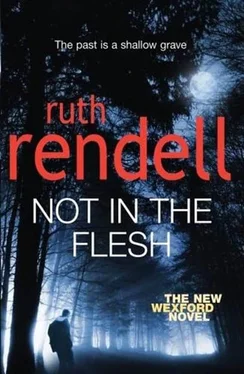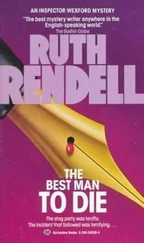But Jim wasn't to be dismissed so easily. Finding Wexford sympathetic and everyone else-Hannah, the scene-of-crime officer, the photographers, the pathologist, and various policemen-of no account, he began giving the chief inspector details of all the houses and their occupants in the vicinity. “That's Mr. Tredown's place next door and down there's the Hunters and the Pickfords. Over the other side that's Mr. Borodin. I've lived in Flagford all my life. There's nothing I don't know.”
“Then you can tell me who owns this land.” Wexford extended his arm and waved his hand. “Must be at least an acre.”
His politically correct sergeant murmured something about hectares being a more appropriate measurement “in the present day,” but no one took much notice of her.
“An acre and a half,” said Jim with a glare at Hannah. “We don't have no hectares round here. Them belongs in the Common Market.” Like many people of his age, Jim still referred in this way to the European Union. “Who owns it? Well, Mr. Grimble, innit? This here is Old Grimble's Field.”
Though he might possibly be compounding a felony, seeing that the subterranean fungi in the bag properly belonged to this Grimble, Wexford thanked Jim and offered him a lift home in a police car.
“And my dog?” said Jim.
“And your dog.”
His offer gratefully accepted, he and Hannah moved away, heading for the road where police vehicles were parked along the pavement. It became, within a short distance, Flagford High Street, a somewhat too picturesque village center where stood the thirteenth-century church, a post office and general store, a shop that sold mosaic tabletops, another purveying lime-flower honey and mulberry conserve, and a number of flint-walled cottages, one thatched and another with its own bell tower.
Wexford, in the car, said to Hannah that, for all the times he had been to Flagford, he couldn't remember noticing that piece of land before.
“I don't think I've ever been here before, guv,” said Hannah.
He had grown accustomed to her calling him that and supposed she had originally got it off the television. The Bill, probably. Not that he liked it, while admitting it was current usage, but the trouble was all his officers had learned it from her and now no one kept to the old “sir.” Burden would know who owned that land. He had a relative living in Flagford, his first wife's cousin, Wexford thought it was.
“There's not much to be done,” Hannah was saying, “until we know how long that body's been there.”
“Let's hope Carina will know by later today.”
“Meanwhile I could find out more about this Grimble and if he owns the old house on it.”
“Right, but let me talk to Mr. Burden first.”
Hannah directed one of her looks at him. She was a beautiful young woman, black-haired, white-skinned, with large brown eyes that softened into a quite disproportionate pitying sorrow combined with a desire to reproach him gently whenever he committed the solecism of using terms or styles she thought obsolete. “Mr. Burden, oh, come,” her glance said while the perfect lips stayed closed. Their relative ranks made reproach impossible, but glances were free. As Wexford himself might have said, a cat may look at a king.
It was a gentle sunny day, what weather forecasters were starting to call “quiet” weather, the temperature high for September, all the leaves still on the trees and most of them still green. Summer flowers in pots and urns and window boxes still bloomed on and on, more luxuriantly than in August. Frosts were due, frosts would normally have come by now, but none had. If this was global warming, and Wexford thought it must be, it disguised its awful face under a mask of mild innocence. The sky had become the milky blue of midsummer covered with tiny white puffs of cloud.
He called Burden a moment after he got into the police station, but the inspector's voice mail told him he was occupied in an interview room. That would be his interview with Darrel Fincher, the teenager found with a knife on him. You could predict, without hearing a word of their conversation, what the boy would say: that he carried the knife for protection, that going home from school or going out in the evening he wouldn't feel safe without a knife. It was “all them Somalis,” he would say. They were everywhere and they all had knives. That was what they called dark-skinned people these days, “them Somalis,” as they had once indiscriminately called Asians “them Pakis.” Wexford turned his thoughts to the Flagford corpse. With luck, it wouldn't have been there for more than a year or two and would turn out to be that chap he could remember going missing a while back after a ram raid on a jeweler's or the old woman who lived alone in a Forby cottage. After failing to visit her for three months her daughter had remembered her existence but on going there had found her apparently long gone. One of them it would most likely be. Strange, he thought, that death and subsequent decay wipe away age and sex and every distinguishing feature so that nothing is left but bones and a rag or two. And a hand, unearthed by an enthusiastic mongrel. How comforting it must have been when men and women (or women and men, as Hannah would say) believed that the body is but a sheath for the spirit which, at the point of death, flies away to some afterlife or paradise. It would hardly matter to you then, if your faith were strong enough, that you met your death from the blade of a knife, a bludgeon, or because your heart gave its final beat in the natural course of things.
He came down to earth from these postmortem reflections when his office door opened and Burden walked in. “That bit of land at Flagford where the dog-walker found a body? Of course I know who owns it. Everybody knows.”
“I don't,” said Wexford. “And what d'you mean, everybody knows? It's not the Tower of London, it's not Harrods.”
“I mean this guy it belongs to tells everyone how hard done by he is by the planning people. His name's Grimble, John Grimble. He's even had a piece about himself in the Courier. He's obsessed. His father died-well, his stepfather it was-and left him the bungalow and the land it's on, and ever since he's been trying to get planning permission to build houses on it. He thinks he's been badly treated-that's an understatement-because they'll let him build one but not more.”
“Where does he live?”
“The street next to me, worse luck. The dog-walker must have known.”
“He's not a dog-walker. He's a truffle-hunter.”
Burden's normally impassive face brightened. “A truffle-hunter? How amazing. Tuber aestivum, Tuber gibbosum, Tuber magnatum, or Tuber melanosporum? ”
Wexford stared. “What do you know about truffles, since I suppose that's what you're talking about?”
“I used to hunt for them with my dad and our dog when I was a boy. Found a good many too. My grandfather used a pig-a sow, of course. Truffles smell like the male swine sex attractant, you see, but the trouble is that pigs'll eat anything, so they tend to eat the truffles before you can stop them and that's a bit expensive when you consider-”
“Mike, sit down a minute.”
Burden, one of those restless people who perch rather than sit and fidget instead of relaxing, balanced himself on the edge of Wexford's desk. He had at last, regretfully, discarded his designer jeans and was wearing charcoal trousers with a knife-edge crease and a stone-colored polo neck under a linen jacket. Wexford thought rather wistfully that when he tried to get himself up in casual gear he just looked like someone's dad going to a fancy dress party.
“Never mind truffles. How long has this obsessive owned the land?”
“Must be at least ten years. More like twelve. I don't suppose the people on either side like it much, having a sort of wilderness next door, I mean. Apparently, when old Grimble lived there he kept the place neat and tidy. His garden was quite famous locally. This one-John Grimble-has let the place turn into a wood. He doesn't even mow the grass. And he says things are going to stay as they are until he gets his planning permission. For two houses, that is. He'll never agree to pulling down that old ruin of a bungalow-it's called Sunnybank, by the way-and building one house. Or that's what he says.”
Читать дальше











